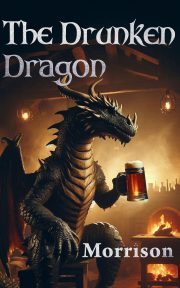Guest Post: Chasing the First Sale–Becoming a Student of the Job
by Steven R. Stewart
 “All artists are willing to suffer for their work, but why are so few prepared to learn to draw?” —Banksy
“All artists are willing to suffer for their work, but why are so few prepared to learn to draw?” —Banksy
I grew up loving stories. Not in a normal way; I loved them so much it hurt. It wasn’t enough just to enjoy them; I had to own them, imitate them, and—eventually—create some of my own. No matter what I did with my life, I knew telling stories was going to be part of it. I wanted to write for comics, for video games, for the screen. But like a would-be musician desperately wanting to “be in a band,” I had to learn an instrument first. Short stories were the first instrument I picked up. If you’re reading this, maybe they’re your first instrument too.
WHY SHORT STORIES?
Because they’re a good first instrument to learn. You can’t really make a career writing short stories—sadly, those days are gone—but they can teach you most of what you need to know to write in other capacities later in your career. They teach you, first and foremost, how to build a story. They teach you how to format a manuscript, how to submit to editors, how to deal with rejection and—occasionally—success.
Short stories are a proving ground. They let you get out there, try a bunch of things out, and make your mistakes small so you don’t have to make all of them big. When I hear an unpublished writer talking about the epic fantasy trilogy they’re going to write, my first thought is, “What a shame.” Not because I don’t believe they can someday do it, but because they’re trying to play to a stadium crowd without learning a G chord first. Practice in the garage, play some local shows, then move on to bigger and better shows. Don’t be the guy or gal with thirty unpublished novel fragments taking up hard drive space. Be realistic, even if it hurts. Look at where you are, own it, and grow from there.
So how do you grow? How do you learn that G chord?
LEARN THE BASICS
You start by making sure you’ve got English down. This means grammar, punctuation, the works. I can hear you groaning from here, but I’m serious. If you aren’t sure where commas go, how to use a semicolon, when to write in past-perfect, what the subjunctive mood is (and why or why not to use it), learn it. I was fairly fortunate in that most of this stuff came pretty easily to me. (I had the benefit of parents who talked to me like an adult when I was still shittin’ the ol’ diaper.) When I find something I still have wrong, I work to fix it, first by googling it to make sure I have it right, then by drilling it into my brain until it’s second nature. Every time [problem x] comes up, a bell goes off in my brain, followed by a little voice that says, “That’s that thing you’ve been doing wrong; you just did it again. Stop it. Forever this time.”
Sound kinda nuts? Welcome to life as a writer.
If you want to be a pro writer, it should bug the hell out of you when you don’t know something. You should make it a point to be as technical as you can stand to be, because the industry doesn’t have time for your mistakes, and there are plenty of people who are just as hungry and talented who know and follow the goddamn rules. Know them. Follow them. (Unless you need to break them for some compelling reason, in which case, for god’s sake, know why you’re doing it.) Don’t fail on a technicality before the game even starts.
MAKE YOUR FUN ABOUT YOUR WORK
Changing what you do for fun (or at least paying attention to it in a productive way) can be really difficult. We don’t like being told to change our lives, not the least little bit, but that’s exactly what I’m about to ask you to do. (I’m being dramatic; this will only sting a little.) Here are some ways you can tweak and transform the things you enjoy to help make you a better writer:
1) Read. For god’s sake, read.
First, find some heroes you can emulate, idolize, and learn from. You know who I’m talking about: those writers you find effortless to read, who make your head spin with their brilliance, who become like old friends and teachers. Chances are, you already have some people in mind. It’s usually these heroes who inspire us to take up writing in the first place. Never abandon them. Keep them nearby as a measuring stick. Don’t aspire to be the best in your school or your critique group or your family. Aspire to be like your heroes. Don’t settle for anything less. And, if at all possible, leave open the possibility of looking past your heroes. You may never grow to their level, but who knows? You may grow beyond it.
Once you have some writers to look up to who are doing the kinds of work you want to do, it’s time to branch out. Read outside your genre. If you write horror, read westerns. If you write sci-fi, read romance. If you write fantasy, read mainstream. Don’t camp inside your comfort zone and spend your career reheating Tolkien or Lovecraft. If you want to do anything of lasting value in your genre, you have to bring new things in from outside it.
Furthermore, read nonfiction. (Yes, documentaries count—75% credit.) Read books on history and science and psychology and astronomy and anything else you can get your hands on. Read books on business and marketing (believe me, you’ll need ’em). Hell, read books about mathematics. Read comics. Devour this stuff. Know the world you live in, and you’ll have more meaningful things to say about it.
2) Listen to audio books. Wait, isn’t that the same as reading? Yes and no. Audio books will teach you something that reading text on a page can’t: the music of language. There is a flow to the spoken word, a kind of rhythm that just sounds right when it’s done well. I’ve never heard of anyone being able to teach this in a class room or a workshop. It’s a slippery, subjective concept, but an important one all the same. Listening to the written word read aloud is the only way I know to improve your awareness of this aspect of writing. I’m not even sure you can actively pay attention to this; just give your ears time with words. Also, reading your own work aloud can—almost without fail—instantly improve it. Read everything aloud during editing, especially before sending it to an editor.
3) Play roleplaying games. Don’t write me off just yet. I don’t give this piece of advice lightly, and I realize it’s not without its dangers.
Roleplaying games use numbers to create a model of the world, which in turn allows you to simulate anything you could possibly imagine. Kinda. This is the danger—not that you will lose your soul or become a baby-murdering cultist or something similarly ridiculous—that you will lose your worldview to that model, and with your worldview, you’ll lose any chance you had of being truly creative. You’ll drop your keys and say, “Oops. Failed my Dex check.” You’ll wonder what level or alignment the characters in your story are. That’s a huge red flag. If you’re not writing a franchise novel for a gaming company and you find yourself rolling up character sheets for your characters anyway, you’ll know you’re in too deep.
(I’ll confess, I don’t see how anybody has time to play anymore, but that’s beside the point.)
I’ve seen this happen to lots of smart, potentially creative people; they lose themselves in the false limitations of the game. Their fiction becomes rigid, like a cardboard cut-out of a story. Combat drags on. Every story is about a team, one member strong, another stealthy, another magicky, another healy.
God in heaven. Don’t. Let. This. Happen to you.
But! If you’re careful as hell, there is one wonderful thing your high school D&D days can teach you:
The Moment.
Players always want to be doing something. They want a reason to be where they are (a goal), they want to know what the next step is (direction), and they want a chance to do something to get there (action). If you can apply this mentality to your fiction—that every moment should have its own entertainment value, not because it’s pretty or clever, but because it’s relevant to the journey and it moves—your style and your readers will thank you for it. Don’t have people walk into a room, say some shit, and walk out again. Put the scene in a cool place, give it some zing, and have the characters do something.
Making up a story on the fly for an audience, being able to gauge their reaction to each event in real time—there are few experiences more valuable as a storyteller. Video games can teach you this same lesson, but you don’t have the benefit of sitting in the creator’s chair; you have to hold the experience up to a mirror to get the full effect.
Here’s “The Moment” at work:
Let’s say you’re writing a fantasy novel about a teenage boy at a swordsmanship school. In this particular scene, your main character needs to ask a female teacher for some dating advice. You could have him go into her office, stand awkwardly by her desk while he spills his guts and talks and talks and talks. OR! You could have him trying to sneak questions in while he’s taking his swordsmanship final, dueling the female teacher in the clocktower of the school, jumping between giant cogs, dodging blows, trying not to get killed, trying to land just one strike before the clock strikes twelve. That’s a hell of a lot more fun. And it opens up all kinds of story opportunities. He might fail the exam he’s so concerned with his girl troubles. He might get injured. He might realize during all the sweaty running around that he’s actually (gasp!) attracted to the female teacher! (“I said parry, not thrust.”)
Mastering “The Moment” isn’t just a matter of flavor. When things move in a scene, they bounce around and collide with other things. You could end up with new ideas that take your story to the next level. So don’t write a dull moment. This doesn’t always mean action; what it means is having an awareness of each moment’s entertainment value, each moment’s importance and inertia.
STUDY
Once you’re harnessing your free time to better your writing, it’s time to learn the nitty-gritty of the craft. There are a few ways to do this well, but one of the cheapest is to read books on writing. I hear a lot of writers talking smack on writing books, saying they don’t really teach you anything, that you’re only ready to learn what you’re ready to learn, that practice is the only way to get better. Half true. Practice is the best way to get better, but there are some things, especially for new writers, that you shouldn’t have to learn through trial and error. Sometimes, it’s easier to have someone just tell you. That’s what writing books can do for you: they can save you time.
I’ve read a stack of writing books in my time, and I can tell you, almost none of them left me feeling empty. I came away from each book with new tools, new perspectives, and new enthusiasm for the job. That’s not nothing, nay-saying snobs! That’s a big something, and it’s worth investing the time.
These books typically fall into a few categories:
1) Craft Books. These teach you the nuts and bolts of writing. The Elements of Fiction Writing books from Writer’s Digest are a good place to start, but be sure to avoid books on manuscript submission, business, the internet, and other topics that are constantly in flux.
I also recommend The 38 Most Common Fiction Writing Mistakes by Jack M. Bickham. This was the first book I ever read on the craft of writing, and it’s a wonderfully-brief crash course for beginners. One read will instantly improve your awareness of mistakes (i.e. shit that doesn’t work) in your writing.
This category also includes genre-specific reference books like (one of my faves) How to Write Science Fiction and Fantasy by Orson Scott Card.
2) Screenwriting/Pure Story Books. Wait? Screenwriting books? What about all that stuff about short stories and learning to play your first instrument? Once you’ve banged out a decent prose style through loads of study and practice, screenwriting books become just as valuable as other writing books—if not more so. They can teach you the essence of story itself better than almost anything else. My Holy Trinity of Screenwriting Books is as follows:
Save the Cat by Blake Snyder
Story by Robert McKee
The Writer’s Journey by Christopher Vogler. (You should also read Joseph Campbell’s book Hero with a Thousand Faces. It’s the source material for this book, but I feel Vogler’s interpretation of Campbell’s work is more accessible and immediately useful for a fiction writer.)
If you’re not a different writer after studying those three books, you have my permission to be concerned.
3) Fire Extinguishers. These are books full of general advice and encouragement. They may teach you some things about craft, but the real value lies in restoring your enthusiasm when you’ve lost it. Writing can be a hard and frustrating job, and sometimes we need someone to remind us of the magic. Stephen King’s On Writing is perhaps the best book of this kind in existence. (Be cautious. Even if you’re not a writer, this book will make you want to be one.) The Art of War for Writers by James Scott Bell is another of my favorites. It’s a slickly-designed little tome full of motivation. In case of burn-out or depression, break glass.
GODSPEED
Writing can be wonderful, but it’s a job nobody will do for you. This means you have to learn the ins and outs of the writing (and how to apply them) for yourself. I’m going to shut up now and end this very long post so you can go do that.
Last thing, honest:
Don’t forget to pay attention. “Study” is a verb. Don’t do the thing where you read a page and don’t know what you read. Know what the things you’re learning mean in practice; otherwise you don’t really know them. If you get bored and feel tempted to coast, just pretend you’re at Hogwarts learning magic—in a way, that’s exactly what you’re doing.
•••
Steve grew up listening to his dad’s ghost stories and never recovered. He attended Uncle Orson’s Literary Boot Camp in 2009 and currently lives in Oklahoma in a small house full of girls. His stories have appeared in Intergalactic Medicine Show, Redstone, Daily Science Fiction, and others. His weekly blog posts on fiction writing and comic books are available at stevenrstewart.com or via his Twitter, @StewartWriter.


